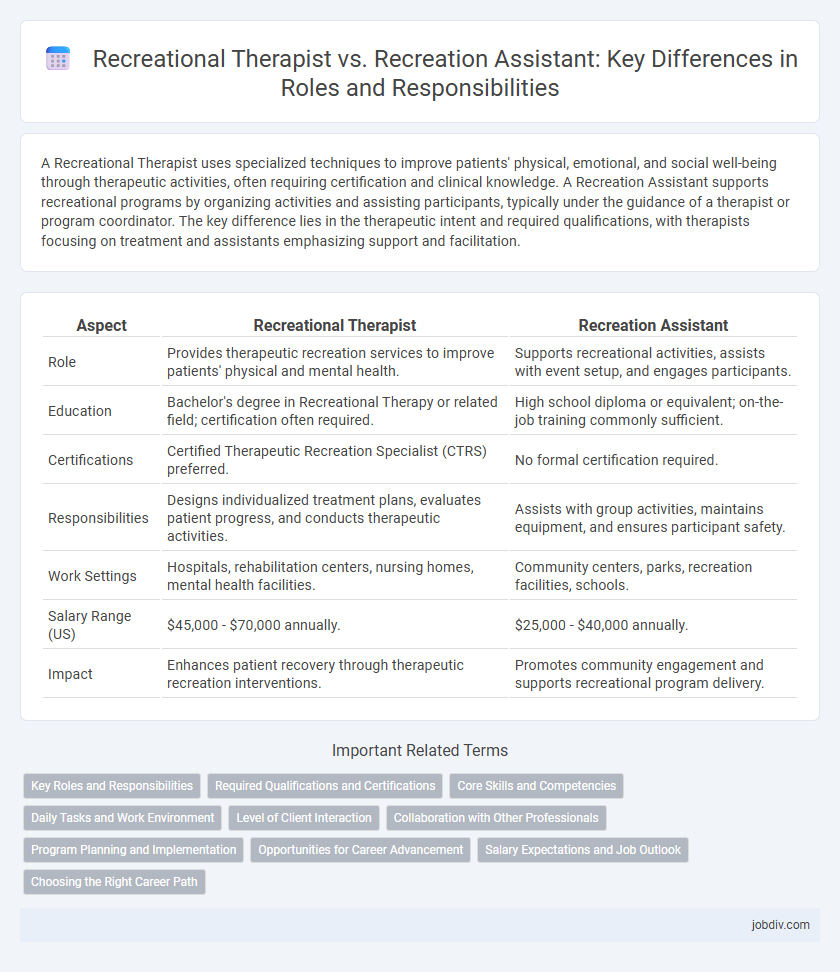A Recreational Therapist uses specialized techniques to improve patients' physical, emotional, and social well-being through therapeutic activities, often requiring certification and clinical knowledge. A Recreation Assistant supports recreational programs by organizing activities and assisting participants, typically under the guidance of a therapist or program coordinator. The key difference lies in the therapeutic intent and required qualifications, with therapists focusing on treatment and assistants emphasizing support and facilitation.
Table of Comparison
| Aspect | Recreational Therapist | Recreation Assistant |
|---|---|---|
| Role | Provides therapeutic recreation services to improve patients' physical and mental health. | Supports recreational activities, assists with event setup, and engages participants. |
| Education | Bachelor's degree in Recreational Therapy or related field; certification often required. | High school diploma or equivalent; on-the-job training commonly sufficient. |
| Certifications | Certified Therapeutic Recreation Specialist (CTRS) preferred. | No formal certification required. |
| Responsibilities | Designs individualized treatment plans, evaluates patient progress, and conducts therapeutic activities. | Assists with group activities, maintains equipment, and ensures participant safety. |
| Work Settings | Hospitals, rehabilitation centers, nursing homes, mental health facilities. | Community centers, parks, recreation facilities, schools. |
| Salary Range (US) | $45,000 - $70,000 annually. | $25,000 - $40,000 annually. |
| Impact | Enhances patient recovery through therapeutic recreation interventions. | Promotes community engagement and supports recreational program delivery. |
Key Roles and Responsibilities
Recreational Therapists design and implement tailored therapy programs that address physical, emotional, and social needs of individuals, often requiring certification and specialized knowledge in therapeutic techniques. Recreation Assistants support recreational activities by organizing, supervising, and maintaining equipment, ensuring a safe and enjoyable environment, typically under the guidance of licensed therapists or program coordinators. The therapist's role is more clinical and goal-oriented, while the assistant focuses on operational and facilitation tasks within recreational settings.
Required Qualifications and Certifications
Recreational Therapists typically require a bachelor's degree in recreational therapy or a related field, along with certification from the National Council for Therapeutic Recreation Certification (NCTRC). Recreation Assistants generally need a high school diploma or equivalent, with some positions preferring basic first aid or CPR certification. Recreational Therapists must hold licensure in some states, emphasizing advanced clinical skills, whereas Recreation Assistants provide support under supervision without mandatory licensure.
Core Skills and Competencies
Recreational Therapists possess advanced knowledge in therapeutic recreation techniques, patient assessment, and individualized treatment planning to improve clients' physical, emotional, and social well-being. Recreation Assistants focus on organizing and leading recreational activities, demonstrating strong interpersonal skills, activity planning, and basic first aid competence. Both roles require effective communication, teamwork, and an understanding of safety protocols within recreational settings.
Daily Tasks and Work Environment
Recreational Therapists design and implement specialized treatment plans using recreation activities to improve patients' physical and mental health, often working in healthcare settings such as hospitals and rehabilitation centers. Recreation Assistants support these activities by setting up equipment, guiding participants in group activities, and maintaining recreational areas in community centers, parks, or senior living facilities. Both roles require strong interpersonal skills but vary in responsibility, with therapists focusing on therapeutic outcomes while assistants emphasize program facilitation and participant engagement.
Level of Client Interaction
Recreational Therapists engage in direct, therapeutic interactions with clients, designing and leading personalized treatment plans to improve physical, emotional, and social well-being. Recreation Assistants primarily support recreational activities under supervision, facilitating group participation without delivering individualized therapy. The level of client interaction for Recreational Therapists is more specialized and intensive compared to the more general, supportive role of Recreation Assistants.
Collaboration with Other Professionals
Recreational therapists collaborate closely with healthcare professionals, including physical therapists, psychologists, and social workers, to create individualized therapy plans that enhance patients' physical and mental well-being. Recreation assistants support this process by facilitating group activities and ensuring the smooth execution of therapy sessions under the guidance of therapists. Their teamwork promotes holistic rehabilitation and fosters improved patient outcomes through integrated recreational programs.
Program Planning and Implementation
Recreational Therapists develop and implement evidence-based treatment plans tailored to improve patients' physical, emotional, and social well-being through therapeutic recreational activities. Recreation Assistants support these plans by organizing and facilitating group activities, ensuring safety, and assisting participants in engaging effectively. Their roles complement each other in delivering structured and goal-oriented recreational programs within healthcare and community settings.
Opportunities for Career Advancement
Recreational therapists often have more opportunities for career advancement due to their specialized training and certification, enabling roles in clinical settings and program development. Recreation assistants typically experience limited upward mobility, often advancing through gaining experience or obtaining additional certifications in recreation or leisure services. Professionals who pursue higher education and licensure in recreational therapy are positioned for leadership roles such as program coordinators or directors within healthcare facilities.
Salary Expectations and Job Outlook
Recreational Therapists typically earn a higher salary, with median annual wages around $50,000 to $70,000, due to their specialized training and licensure requirements. Recreation Assistants often have lower salary expectations, averaging approximately $25,000 to $35,000 per year, reflecting their entry-level roles and fewer educational qualifications. Job outlook for Recreational Therapists shows a projected growth rate of 8% through 2030, faster than average, while Recreation Assistants have a steadier but slower growth rate near 5%, influenced by demand in healthcare and community centers.
Choosing the Right Career Path
Recreational therapists design and implement therapeutic activities to improve patients' physical and mental health, requiring specialized education and certification, whereas recreation assistants support recreational programs and facilitate general activities with less formal training. Choosing the right career path depends on your interest in clinical intervention versus program support, as well as your commitment to education and certification requirements. Understanding the roles, responsibilities, and long-term career opportunities is essential for aligning your professional goals with the demands of each position.
Recreational Therapist vs Recreation Assistant Infographic

 jobdiv.com
jobdiv.com